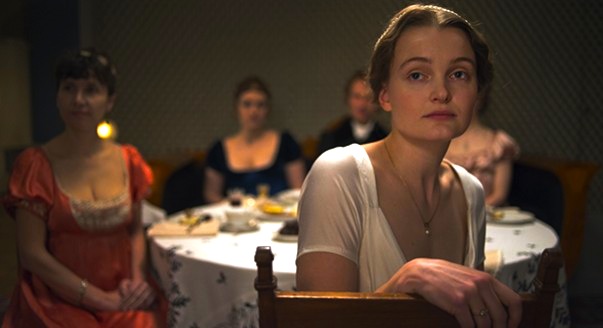
That crazy little thing called love. Is it even possible to count how many times the theme of love was used in movies? Doubtful. But the times it’s been used with such sardonic wit, polished with such fine veneer, is much easier to count, and Jessica Hausner’s “Amour Fou” — which had its world premiere in the Un Certain Regard section of Cannes — could be ranking among the very top of such a list. Fans of austere auteurism, immaculate framing, and laughter that leaves lumps in your throat will be floating on cloud nine with this one. A production that suffers a bit too much from heartsickness and stumbles on awkward moments stop you from falling in love with it completely, but nonetheless, the film still screams for a spotlight to be directed at Hausner.
Inspired by the true story of poet Heinrich von Kleist, “Amour Fou” makes a wonderful deviation from merely recounting historical events or using a predominantly male perspective, and centers on Henrietta Vogel (Birte Schnoeink) instead of Heinrich (Christian Friedel). Henrietta is married to politician Friedrich (Stephan Grossman) who can’t connect with his wife’s proclivity for poetry and is most comfortable when talking about the new law on taxes. In fact, the only thing keeping their 12-year-long marriage from drowning in a sea of melancholia is the daughter they are raising together. Being a woman, and self-described “property,” there’s not much to do for Henrietta other than throw parties for fellow aristocrats and social figureheads. Heinrich is such a one. His poem, about a marquess falling ridiculously in love with her rapist, moves Henrietta in ways she can’t quite explain and she welcomes the poet’s presence, much to the raised eyebrows of her husband.

At one of these soirees, Heinrich declares his love to his cousin Marie (Sandra Huller) and, in the first of many awkwardly hilarious scenes, proposes his version of marriage; committing suicide together. Heinrich makes it clear that he will first shoot her and then himself. Marie laughs it off and shrugs away, and Heinrich is left to find someone else to share his eternal depression with. Henrietta seems to be the logical choice, as the lack of love he sees in her life (both coming from and towards her) makes them kindred spirits in his poetic opinion. Much like Marie, Henrietta takes the proposal as excessively creepy and walks away. But when she falls mysteriously ill, her perspective begins to shift and just like that, Heinrich’s offer doesn’t sound all that bad.
The foppishness that’s prevalent throughout Hausner’s picture is one of the biggest takeaways. Is this a scathing commentary on artistic lifestyles of the Romantic Era? When you laugh, are you laughing at the characters, or with them? These kinds of puzzling questions keep shifting one’s opinion of the film uncomfortably from side to side, but those who aren’t particularly interested in the director’s intentions will focus on the laughter that the film evokes.

As such, “Amour Fou” is a delightful comedy of errors and acidic analysis of love’s remarkable talent for idiocy. To help along the way is Hausner’s perfectly placed mise-en-scene, including the actors who are as immobile as the furniture and a stereoscopic wallpaper that imprints the film’s style into your mind. When it comes to framing, and barely moving, Hausner has learned well from the likes of Carl Theodore Dryer and Akira Kurosawa, every prop neatly placed, the maid’s meticulously tea-pouring abilities always in line of sight, and no body or head overlapped. Schnoeink and Friedel work with what little movement is allowed to them, diverging in effect; with Friedel, who has a Klaus Kinski-esque crazed look about him, scenes are often funnier thanks to how obscenely his serious posture and delivery conflict with what he’s actually saying, but with Schnoeink the formality is like a prison she’s all too happy to be in, which of course makes it all the more uneasy and heartbreaking. The ease with which she declares herself to be the property of her husband kills the giggles instantly. She is, sadly, the only piece of the puzzle that brings any kind of heart to this story. Intentional or not, that’s still something of a hiccup here.
In due course, what makes “Amour Fou” a fascinating, if at times frustratingly idle experience, is that it seems to be saying so much with its upfront style, injections of black humor, and focus on stifled feminine disposition, yet still feels disappointingly unresponsive when mulling it over in your head. The thematic chain connecting death, love, and disease, is present and incredibly beguiling, yet still feels like one too many kinks keep it from full expression. It’s as if the varnish used to give the film’s squeaky-clean look is too thick for its own good and the film’s style dominates its matter. That being said, Hausner’s direction is assuredly controlled from start to finish, and after a third premiere in the Un Certain Regard sidebar, one only hopes that next time around Cannes will wise up to her talent and allow her a slot in Competition. For a unique approach to an immortal theme, “Amour Fou” is a winner, if a slightly feeble one. [B]
Browse through all our coverage of the 2014 Cannes Film Festival by clicking here.

